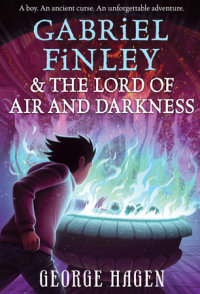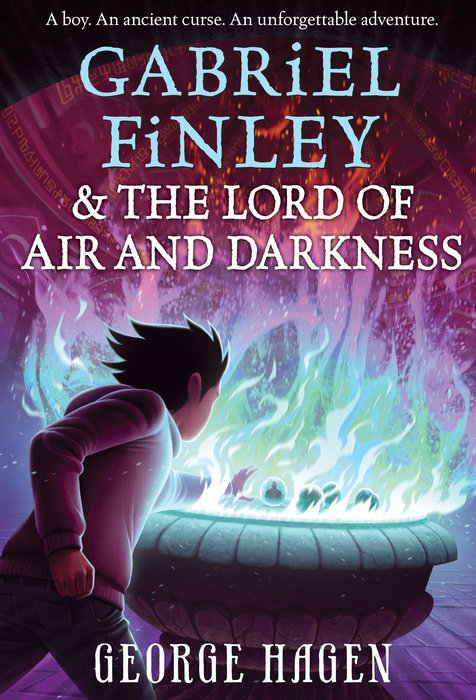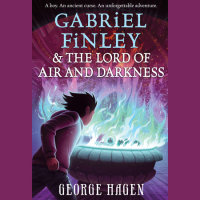Gabriel Finley and the Lord of Air and Darkness
This exciting, emotionally rich middle grade fantasy continues the adventures of Gabriel Finley and the Raven's Riddle—which has been compared to Harry Potter, The Mysterious Benedict Society, and Phillip Pullman's His Dark Materials.
Gabriel Finley is longing to find his mother, who vanished without a trace when he was just a baby. Along with Gabriel's raven, Paladin—with whom he has a magical bond that enables them to become one creature and FLY!—and his three friends, he ventures back to the ruined underground city of Aviopolis to free her from the rune in which she has been imprisoned. But Aviopolis is home to Corax, the Lord of Air and Darkness, who is also Gabriel's uncle. And before Tabitha Finley is released, Gabriel must answer a riddle...or else be imprisoned for eternity within a rune himself.
Praise for Gabriel Finley and the Raven's Riddle:
"Both startling and moving—a vivid, compelling fantasy." —Norton Juster, author of The Phantom Tollbooth
"Enchanting." —Pseudonymous Bosch, The New York Times
"A great read for fantasy lovers who have worn out their copies of Harry Potter." —School Library Journal, Starred
"A first-rate fantasy for middle-grade readers. Like Harry Potter,...Philip Pullman's His Dark
Materials series,...and Trenton Lee Stewart's Mysterious Benedict Society books." —Booklist, Starred
"Not to be missed." —Publishers Weekly, Starred
An Excerpt fromGabriel Finley and the Lord of Air and Darkness
Tabitha Finley
The weeks after Gabriel had rescued his father were the happiest the boy could remember. It was January, and his father took him for bike rides, to movies, and for pizza at their favorite restaurants in Brooklyn. They strolled along the waterfront as barges and ferries passed by, and went sledding down the snowy hillsides of Prospect Park.
During these moments they tried to catch up on the three years they had been apart. Mr. Finley wanted to know about the friends--Pamela, Abby, and Somes--who had helped Gabriel rescue him from Aviopolis; he asked who Gabriel’s best and worst teachers were and tried to answer his trickiest riddles. He wanted to hear about Gabriel’s hobbies and his favorite books, and where the tastiest dumplings could be found in the neighborhood.
Eventually, they got around to discussing a more serious matter--the torc--and how it had caused Gabriel’s mother to disappear when he was just a baby. On a sunny day father and son went kite-flying in the park. Mr. Finley released a seven-foot multicolored kite into the sky, and as it soared and swooped above them, Gabriel asked his father a question.
“Dad? Could you please explain exactly how Mom disappeared?”
Mr. Finley lowered the kite string and looked at his son with gentle surprise. “Yes, of course,” he said. “I’ve been waiting for you to be old enough to understand. You had just been born, and your mother and I were living in a little turf-roofed cottage in Iceland,” he began. “One day I went hiking in the caverns where there was a tomb--”
“Oh, I know that part,” Gabriel interrupted. “And I know how you got injured, and made a wish to get home, and your leg healed and you realized that the torc was on the staff you were using to help you walk. And when you did get home and stepped through the front door, you saw me, but--”
“Your mother vanished into thin air,” said Adam.
He paused to play out string and watch the kite float higher above the river.
“The torc answered my wish, but its price was to ruin me. One minute Tabitha was there, as full of life as anyone can be--and the next she was gone.”
Now Gabriel had to ask the dreadful question that haunted his dreams and lingered on the edges of his wakeful thoughts.
“Dad, is she dead?”
Adam accidentally jerked on the kite string. “Dead? Oh, my goodness. Absolutely not! If she were, I would feel it!”
“How?”
For a moment, Adam Finley looked embarrassed. He was a professor, a logical man who cited evidence to prove his points. He hated to admit that a feeling could be more significant than a fact. He chewed at his beard for a moment. “Well, I can’t explain it.”
Then he frowned at the kite and began to turn the string winder to draw it nearer. “I believe that when the torc makes people disappear, it splits them--soul from body. I think Tabitha is alive because . . . well, because I sense her with me.”
The professor looked worried that his son might laugh, but Gabriel seemed relieved.
“Dad, has she ever talked to you?”
“No. I just feel her presence.” Mr. Finley looked anxiously at Gabriel. “Has she talked to you?”
“No, but . . .” Gabriel shrugged. “Sometimes I feel the same thing. She’s here, somewhere.” He raised his hand to his heart and rested it there.
“Ah.” Adam nodded. “So it’s a matter of figuring out how, um . . .”
“To bring her back?” offered Gabriel.
Before Adam could reply, a gust almost wrenched the metal string winder from his grip. “Good heavens, this wind is quite strong,” he said. “Help me.”
They both wrestled to hold on to the winder, but snap! The frayed end of the string whipped away, and the untethered kite flew upward until it was lost in the great blue sky.
The two of them stared bleakly into an infinity of blueness.
“Oh well,” sighed Adam at last. “It’s just a kite.”
As they walked back along the path, Adam continued their conversation. “Gabriel . . . I am quite determined to find your mother. I promise you that. We will bring her back.”
“How?”
“Well, the one thing we know about the physical world is that nothing just disappears. That kite, for example, will land somewhere.”
“We just don’t know where,” said Gabriel sadly.
“Don’t lose hope,” said Adam. “On Monday I go back to teaching my classes, but I’ll use every spare minute I have to find out where ‘disappeared’ things go.”
“What can I do?” asked Gabriel.
“Continue with school, of course,” replied his father. “Teachers, classes, homework, the usual.”
Gabriel’s heart sank. How could he possibly go back to the usual when his father had raised the possibility of bringing his mother home? School was so boring after rescuing his father from a prison cell and defeating his demon uncle in a duel of riddles, not to mention escaping a collapsing underground city.
“But I want to help find Mom,” he said. “Don’t forget, I have my own amicus, Paladin. We could paravolate all over the city and even farther.”
“And there are plenty of valravens loyal to Corax who would relish capturing you, especially for revenge.”
“But I’ve fought valravens before. Paladin and I fought an eagle! And we have birds on our side, like the great horned owls!”
“Gabriel?” Mr. Finley suddenly became stern. “I don’t want you to paravolate.”
The boy’s shoulders dropped. “But why? I’m not like Corax when he was a kid.”
Adam laughed. “I wasn’t suggesting you are.”
By now, they were walking beneath the span of the Brooklyn Bridge. The slick gray current of the East River rolled by with immense power and speed.
“Dad?” said Gabriel, finally. “Do you remember me telling you about the robin named Snitcher who stole the torc after Corax vanished?”
“Yes, you followed him out of Aviopolis and he disappeared.”
“Well, what happens if he makes wishes with the torc?”
“Very good question,” replied Mr. Finley. “Have you seen him?”
“No, but if I do, shouldn’t I try to get the torc back?”
The professor paused for a moment to think. “I’m not too concerned about a robin,” he said at last. “They have such small brains; they’re much more likely to take orders than give them.”
“Whew,” said Gabriel. “I was worried about that.”
Snitcher
And what had happened to the robin?
In the weeks since the fall of Aviopolis, Corax’s little red-breasted lieutenant had been enjoying his freedom in the blue skies of Brooklyn. He didn’t miss digging for ugly gray grubs or sipping from the murky puddles of Corax’s gloomy underground domain. Now he enjoyed pink worms, doughnut crumbs, and pizza crusts.
In fact, the robin regretted stealing the torc because it weighed so heavily around his neck. He had tried to shake it off, but it grew tighter when he resisted it. Snitcher might have tolerated this, too, but for the voice that spoke from the necklace.
Snitcher? Where are we? said the voice one frosty morning as the robin settled upon a smoking chimney to warm himself.
The startled robin glanced around. “Who said that?”
It is I, Corax, you fool. . . . Have you forgotten that my soul is trapped inside this thing?
Indeed, with each word, the torc shook with fearsome intensity. The robin gulped.
“Dear master,” he replied, “we’re in a place called Brooklyn. Your great citadel is rubble and dust.”
Then my valravens must be awaiting my orders. I have a domain to rebuild. We must find my body! I must plot my revenge!
“How would I know where your body is? You’re just a voice in my ear,” replied the robin.
This reply infuriated Corax. How can I rule like this? Formless, adrift, lost . . . I must wish myself free!
The puzzled robin waited expectantly.
Several moments passed without any bright flash, tingle, or transformation.
“Master?” said the bird finally. “What’s taking so long?”
It seems I am helpless, replied Corax. This torc binds me as tight as manacles and leg irons.
The voice stopped, as if thinking.
Snitcher, I have an idea, it began again. Perhaps if you were to wish me to be united with my body, it would obey.
“Yes, Your Eminence!” The robin puffed out his scarlet chest, and his two beady black eyes trembled as he tried to concentrate (a staggeringly difficult task for a robin). “I wish that my master, Corax, the Lord of Air and Darkness, were whole and standing here before me.”
Again, nothing happened. The torc hung around the robin’s neck like a dull trinket.
“Hmm,” said the robin. “Perhaps it is broken, Your Eminence.”
Broken? Corax’s voice turned scornful. Impossible! It answered the Finley boy’s wishes. He brought down my citadel and destroyed Aviopolis.
“I think it’s broken,” repeated the dim bird.
Black magic does not break, muttered Corax. And if my soul is trapped in this torc, what has become of the rest of me? Where does the body go when the soul is cast adrift?
“It’s all Gabriel Finley’s fault. He brought down your citadel and destroyed Aviopo--”
I just said that! snapped Corax.
“The Finley boy should be destroyed,” suggested the robin. “That would solve all your troubles. Useless child. And his father. I bet he broke the torc.”
Silence!
They were a most unhappy pair. The robin wouldn’t stop talking and Corax wouldn’t stop telling him to be quiet.
Eventually, however, something uttered by Snitcher gave Corax an idea. “I’ve watched them through the window,” the robin confessed. “The boy shares riddles with his raven, the father reads from his wall of books--”
That’s it! Adam Finley has studied the torc for years. The boy and his father understand its power. They must hold the key to my freedom.
“I know the way to their house,” said the robin.
Very good, Snitcher. We must listen at their windows. Go there now!
“Yes, Eminence.” Snitcher took to the air, and flapped over the rooftops of Brooklyn while the cumbersome necklace bore down on his neck.
Presently, he began to feel tired and hungry. “Your Eminence,” he pleaded, “I’m starving. Surely first I could--”
I command you to go to the Finley house!
In moments, the frightened robin had flown to a window on the topmost floor of an old brownstone on Fifth Street. He perched on the windowsill, then peered into the room, with its single occupant.
It was a boy around twelve years old, asleep in bed. Upon a bed knob was a very handsome raven with black satin feathers and a ruff of single quills around his neck. This was Paladin.
The raven had been sleeping with his head tucked under his wing, but grew alert when he heard a sound. His neck feathers rose in alarm, and he turned to the window.
The robin stared back at him, his little black eyes ruthless and vengeful.
Gabriel, wake up! There’s a robin at the window. I’m positive that it’s Snitcher, with that wicked torc around his neck.
Paladin’s silent message woke Gabriel, who quickly rubbed the sleep from his eyes and sat up. He squinted at the window and saw the little bird through the pane of glass. Then he noticed the indentation around the robin’s scarlet breast.
“You’re right, Paladin,” he replied. “But my dad said there’s no safer place for the torc than around a robin’s neck--they’re followers, not leaders.”
Paladin scrutinized the robin. I’m not so sure your father is correct. I don’t like the look in that bird’s eyes.
As Gabriel got dressed, Paladin raised his wings and flew at the window, issuing a threatening cry. The startled robin staggered backward, and toppled out of view.
From downstairs, a voice announced breakfast. Gabriel set Paladin upon his shoulder and hurried to the kitchen.
Adam Finley was eating breakfast beside a tall, spindly woman with red hair bound in a topknot. This was Gabriel’s Aunt Jaz, Adam’s sister. She was a schoolteacher. Her faint eyebrows were drawn in with dark mascara to resemble two little boomerangs, which gave her an expression of perpetual surprise.
“Good morning, Gabriel,” she said. “Bonjour, Paladin.”
“Bonjour, Madame,” said Paladin, bowing to Aunt Jaz.
Gabriel glanced curiously at Paladin. “I didn’t know you spoke French.”
“I’m teaching him a little each day,” explained Aunt Jaz. “He’s a quick learner.”
At that moment, a girl about Gabriel’s age entered the kitchen. “Good morning, Mr. Finley, Aunt Jaz,” she said.
“Oh, good morning, Pamela,” said Aunt Jaz.
Pamela had a sensitive, yearning expression, deep brown eyes, and long, curly dark hair. She and her mother had been living with the Finleys since their apartment building had burned down last year. Pamela set her violin case by a chair and went to the stove to prepare some oatmeal.
Mr. Finley glanced up from his newspaper to see Pamela pour water into a saucepan and set it on the burner. “You know,” he whispered, “the stove could make that for you.”
“What?” asked Pamela.
At that moment, Pamela’s mother, Trudy Baskin, entered, and Adam slyly put a finger to his lips, hinting that this was not a subject to be discussed in front of her.
Although Trudy had once loved riddles, and solved one as a favor for Corax long ago, the years had changed her. She had cropped gray hair and piercing blue eyes, and a pinched, irritable personality. Gabriel didn’t know much about her past, but he felt pretty sure that some unpleasant event had erased her sense of humor and fun.
This morning he braced himself for Trudy’s first words.
“Oh,” she said, noticing Paladin on his shoulder. “You brought that filthy bird downstairs.”
“He’s not filthy,” Gabriel replied.
“He’s full of germs.”
“We’re all full of germs,” countered Gabriel. “That’s a fact.”
“It’s a filthy fact.” Trudy sniffed.
Gabriel uttered a soft sigh, which earned him a sympathetic smile from Pamela. She understood his special relationship with Paladin. As one of the three friends who had helped Gabriel rescue his father from Aviopolis, Pamela knew all about paravolating and valravens and the power of the torc.
Pamela most envied Gabriel because of the Finley family history of bonding with ravens. She wished she could be a raven’s amicus and fly, as he could.
“Well, I must be off,” said Aunt Jaz, finishing her coffee. “I have a new teacher to welcome at school today. Gabriel, are you coming?”
Gabriel had just plucked his toast from the toaster, so he waved to Aunt Jaz and explained that he would walk with his friends.
“Okay. Have a nice day, everybody!” said Aunt Jaz.
As the front door slammed, Pamela gave a wistful sigh. “I wish my school were just down the hill instead of a long subway ride away.”


